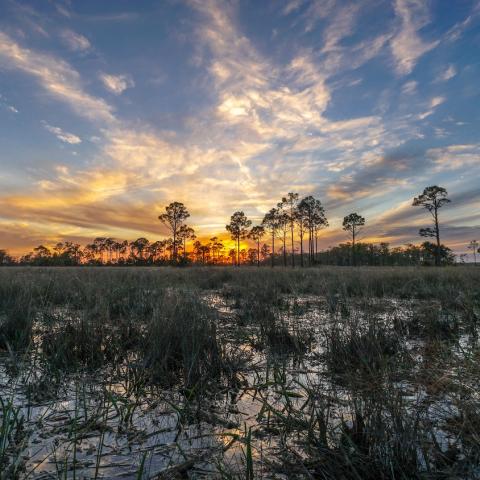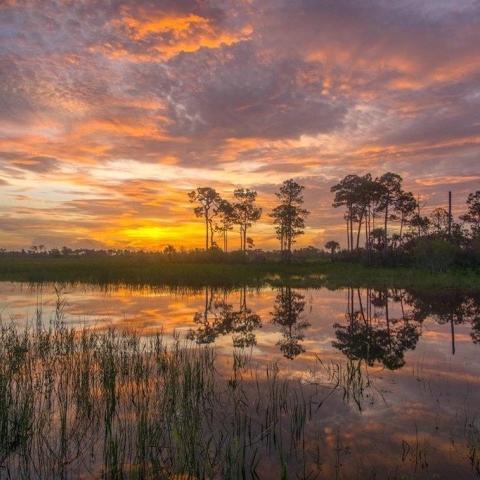
Burnett Oil Co. President Charles Nagel accused the U.S. Army Corps of Engineers compliance officer in Florida of overlooking facts regarding his company's work in Big Cypress National Preserve. Natural Resources Defense Council officials, however, say the company has failed to reclaim the landscape as required, and provided this photo to support that contention/NRDC
In a biting response to U.S. Army Corps of Engineers' charges that his company's oil exploration in Big Cypress National Preserve was damaging the landscape, Burnett Oil Co. President Charles Nagel said the Corps' compliance chief in Florida was terribly misinformed and seemed to be being fed misinformation by opponents.
"We respectfully believe that you are unaware of all the facts, and that your conclusions appear to be based on selective information given to you by project opponents," Nagel wrote after Robert. J. Halbert, the chief of compliance and enforcement for the Corps' Jacksonville District, wrote that the company was impacting Big Cypress by "mechanized land clearing, ditching and channelization" with its exploration work.
Four years ago the National Park Service issued Burnett Oil a permit to conduct exploration work through the use of 30-ton vibroseis vehicles that shake the earth to create sound waves that geologists use to detect oil reserves. Nearly 50 requirements were attached to the permit, including one calling for crews to follow behind the ponderous vehicles to simultaneously erase any ruts their bulk imprinted on the marl prairie.
On March 6, Halbert sent a letter to Nagel charging that the exploration work was not in compliance with the Clean Water Act and had adversely affected the preserve's landscape. "The Corps concludes that the survey activity caused an impact that resulted in a change in the bottom elevation of the wetland, that the activity caused an identifiable individual and cumulative adverse effect on aquatic function, and that the survey had the adverse effect of degrading a water of the U.S."
A month later the compliance chief's boss, Colonel Andrew Kelly, overturned Halbert's findings, writing that, "Jacksonville District rescinds the conclusions specified in the previous letter and asserts no further action is being taken by Jacksonville District or required of Burnett for its completed seismic survey."
"Given the environmental sensitivity in the Big Cypress National Preserve and your expressed commitment to environmental stewardship, Jacksonville District looks forward to working with you on any future actions to clearly and transparently identify and take the appropriate action on any regulatory requirements and communicate in a professional manner as we aspire to do with every potential applicant," Kelly added.
Nagel's rebuttal to Halbert's letter was written on March 12. A copy was obtained by the Natural Resources Defense Council, which had asked to meet with Kelly to understand why he reversed Halbert's findings, and provided to the Traveler.
In his letter, Nagel told Halbert that the exploration was permitted "after years of environmental review," and that National Park Service, U.S. Fish and Wildlife Service, and Florida Department of Environmental Protection all worked with the company to ensure it was within compliance. He also equated the 30-ton vibroseis vehicles with off-road vehicles, and pointed out that the Park Service weighed in on whether Burnett Oil needed a Clean Water Act permit before it issued the permit.
"Simply driving an ORV through wetlands does not constitute dredging or filling. The Corps is aware of decades of ORV use in the Preserve and has never required permits," the Park Service said when asked whether Burnett needed a Clean Water Permit, according to Burnett's letter.
The oil company president then added that, "if the U.S. Army Corps of Engineers now takes the position that operation of off-road vehicles in wetlands requires a Clean Water Act Section 404 permit, then thousands of Floridians need federal permits to use their swamp buggies."
Nagel also made a point to note that opponents of his company's work had obtained a copy of Halbert's letter the day it was sent, March 6, while Burnett Oil didn't receive it for "nearly a week later."
"We literally have learned about this letter when we saw a press release from one of the project opponents," he wrote. "This timing is consistent with your letter being the product of an orchestrated effort by project opponents."
Alison Kelly, a senior attorney with NRDC and no relation to Col. Kelly, held to her organization's position that Burnett Oil is not adequately reclaiming the preserve's landscape as the Park Service required in its permit.
"Burnett Oil Co. is required by its state and federal NPS permits to reclaim the seismic lines concurrently with seismic operations. That did not happen because they drove multiple passes over the same areas, despite their claims during the (National Environmental Policy Act) process that they wouldn’t have to do that," she said Friday in an email. "They attempted to reclaim the seismic lines at least twice in the dry season. First, reclamation isn’t the same as restoration – reclamation means they are merely using rakes and shovels to push dirt back into the seismic lines. Restoration would include replanting of wetland vegetation – including cypress trees – that they cut or run over, but they aren’t required to do that.
"Burnett’s reclamation attempts have not been entirely successful – the elevation of the seismic lines we’ve observed are still lower than adjacent undisturbed wetlands, which is why the seismic lines fill up with water during the wet season, as shown in the" above photo, Kelly said.
Kelly also said she had been told by Florida environmental officials that Burnett Oil's contractor did four days of reclamation in April, "but couldn't finish due to social distance requirements."
"But our position is that the oil company should not be behind on reclamation in the first place. The agencies should have required the company to reclaim the seismic lines concurrently during survey activities, as permitted," she added.
"After the initial seismic operations in 2017 ended due to historic rainfall, the oil company should have been required to complete any outstanding reclamation in the dry season in 2018 before collecting any more seismic data. Instead, Burnett prioritized seismic data collection over completing the outstanding wetland reclamation in 2018 and, as a result, are still not caught up on all the reclamation. Additionally, they haven’t yet begun any compensatory wetland mitigation for the loss of wetland functions that have occurred over the past three years."



 Support Essential Coverage of Essential Places
Support Essential Coverage of Essential Places







Comments
Learned a new word today.